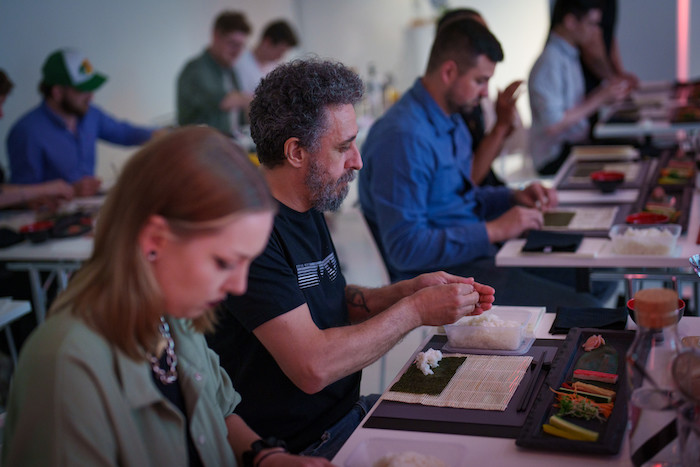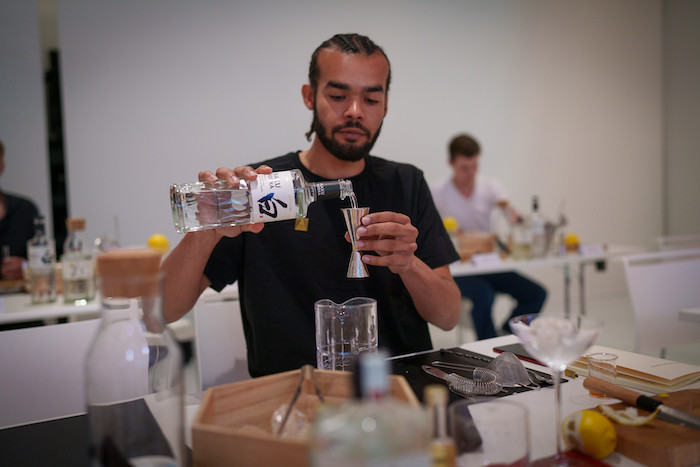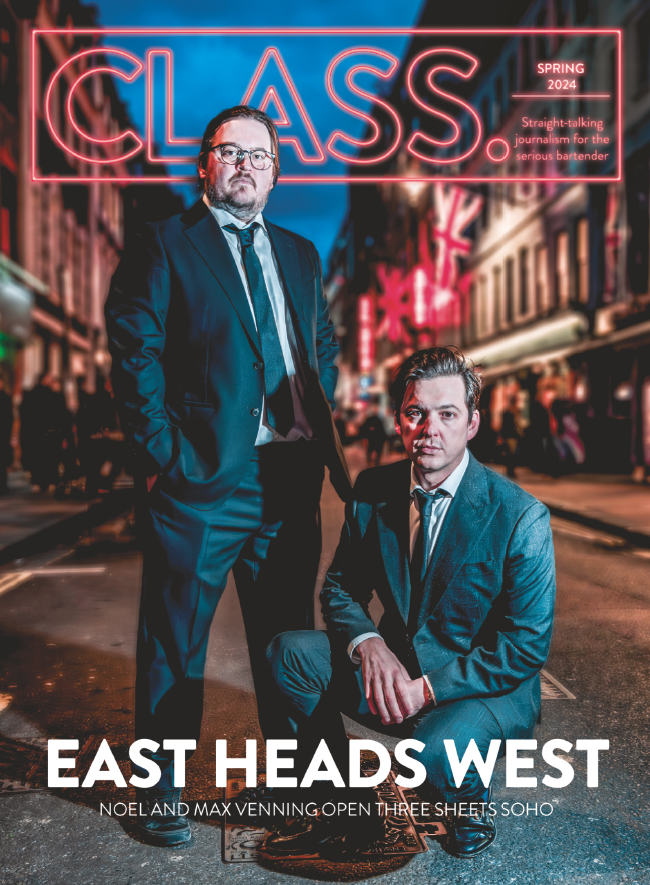
CLASS speaks to Raffaele di Monaco, UK brand ambassador at The House of Suntory, about the DOJO advocacy programme.
1/ The House of Suntory DOJO advocacy programme has expanded across the country this year. Can you tell us more about this year’s programme and the cities you toured?
2023 has been an exciting year for the DOJO programme. Three years on from its original launch, this year saw us expand the programme to tour Manchester and Edinburgh, in addition to London. The expansion meant that 100 bartenders - twice as many than previous years - across three of the UK’s leading hospitality hubs were able to immerse themselves in the art of Japanese bartending and learn directly from Japanese Craft Masters and hospitality industry leaders.
The two DOJO tours, consisting of two 'Monozukuri’ masterclasses, hosted 25 bartenders in each city. The tours took place in July and September. In July, our first tour started in London, then headed to Manchester before ending in Edinburgh. This tour consisted of the Sushi and Seasoning masterclass, centred around the Japanese art of balance and seasoning, including a Haku vodka tasting. In addition, this leg of the tour saw our Ikebana and Aesthetics masterclass return. Here, we focused on the centuries-old Japanese art of arranging flowers – Ikebana and during the sessions, bartenders learned how to apply the delicate skill of Ikebana to cocktail garnishing. The session also included a Roku tasting.
In September, we held our second tour of the programme which was all about the art of Dashi and Blending, including a tasting of the blending components of Toki, as well as our Chadō and Hospitality masterclasses, explored via the traditional Tea Ceremony, including a tasting of Hibiki.
The Japanese approach to bartending is unlike anything else. From the laser focus on detail, to embracing Omotenashi (wholeheartedly look after guests) and Monozukuri (craftsmanship and striving towards perfection), the collective approach elevates bartending to an artform.
2/ Who hosted this year’s programme and what topics did you cover?
As Brand Ambassador, I have been the lead host and throughout this year’s masterclasses, I was also joined by four incredible Japanese Craft Masters, Keiko Smith, Izumi Nakamura, Eico Kano, Kevin O’Duffy - each of whom have helped us to bring the principles of Japanese bartending to the fore, with the aim of enhancing our bartenders’ repertoires and offering unparalleled hospitality experiences for their customers.
Firstly, Keiko Smith, our master of Ikebana, hosted our Aesthetics Masterclass, focusing on the Japanese approach to taking time to appreciate the details by teaching our bartenders the art of Ikebana (Japanese flower arranging).
The second master, Izumi Nakamura, the General Manager of Sozai cooking school, delivered our seasoning masterclasses. Izumi is a Japanese Chef with an abundance of experience in the art of rice and seasoning. For DOJO, Izumi showed our bartenders how to make sushi, specifically how important it is to cook and season the rice perfectly - as getting this right is key to the delicate balance in acidity, sweetness, and saltiness. How does this relate to the art of bartending? Well, through understanding the importance of balancing flavours using sushi, our bartenders left with the skills to be able to achieve the right balance of flavours in their own cocktail serves.
During the masterclass, the concept of sushi seasoning was applied to a martini, using House of Suntory’s Haku vodka. Haku is made from Koji rice which has sweet, light elements that need to be carefully looked after with the seasoning that you are applying to it. When making the martini, bartenders had access to a variety of seasonings - from ponzu to rice vinegar, smoked rice vinegar, sakura rice vinegar. From here, they tasted each before creating their very own take on a martini and balancing these flavours with the soft, round, and subtly sweet taste of Haku.
A key takeaway for our bartenders during the sessions was ensuring that the seasonings weren’t the main flavour profile but instead, complimented each other to elevate and enhance flavours. We don’t want to taste rice vinegar…yet we don’t want to taste anything on its own. It’s about harmony, the collective, and the overall experience.
We also had our Blending Master, Eico Kano, who took participants through an exploration of Japanese dashi, and how this links to the art of blending whisky.
Then, to bring the learnings from the DOJO masterclasses back to hospitality, Kevin O'Duffy, our Hospitality and Chadō master, taught our bartenders about the importance of looking after guests by teaching the most authentic ritual there is in Japan - Chadō, or more commonly known as the Japanese tea ceremony. In Japanese culture, training in Chadō helps us to understand etiquette, with our bartenders having left the programme with skills that will help them to elevate the hospitality experience for their own customers.
3/ Why do you think Japanese craftsmanship and bartending culture are so important – what can UK bartenders learn?
The takeaways really are that from respecting rice, to understanding dashi, bartenders can essentially take insights from the programme back to their roles on a day-to-day basis - it’s about understanding key elements and executing them well, with attention and care.

So, a major takeaway is that less is more, which is very applicable to Japanese culture, especially with seasoning. You don’t want to mask something - you want to elevate it and make the flavour profiles that already exist even more pronounced. Keep it minimal and pay attention to detail.
In our seasoning masterclass, the laser focus on detail is another lesson learned, exhibited in the care taken to make sushi. From harvesting rice, to washing and polishing it before it’s left to soak, and then thinking carefully about seasoning ratios, all before the care it takes to roll the sushi. It’s all very much a showcase of Japanese craftsmanship, their unique attention to detail and is a skill we hope our bartenders left the session with.
And thirdly, a key takeaway is the meaning of purpose in Japanese culture, which really relates to us as a house and as a brand - the understanding that in Japan, there’s a reason behind why things are done a certain way, it is extremely purposeful. Overall, the bartenders were able to capture the true essence of Japanese craft and bring it to their skillset.
4/ There’s also a competition element to the programme – tell us more…
There is indeed a competition element to the programme, which takes form in the ‘Kaizen challenge’. Kaizen is the Japanese concept of “continual improvement”. This challenge encouraged participants to hone their newfound skills from across the Monozukuri Masterclasses, such as those learned from sushi seasoning, by applying them to a classic cocktail.
The bartender who created a cocktail that best reflects ‘kaizen’ was awarded with the chance to win a place at the DOJO Finale in November. This final stage will see the four bartenders from each city present their Kaizen Classic to judges including famed Bar Master Hidetsugu Ueno of Bar High Five in Tokyo, with the two successful contestants winning a once-in-a-lifetime trip to Japan in Spring 2024.
At the very core of the DOJO programme is the bartending community and this month, twelve DOJO Finalists have been invited to two community events to immerse them in Japanese culture with sessions on Japanese knife sharpening and a Kanpai Sake Brewery tour, as well as several Japanese inspired DOJO mini events in London throughout the year.
5/ How do bartenders sign up for DOJO 2024?
We are really excited for what is to come in November and the finale, with our twelve finalists putting their newly learned skills to the test by elevating a classic cocktail, with the chance to win a once in a lifetime trip to Japan.
For those looking to take part in next year’s DOJO programme, applications will be open from April 2024. More details will be revealed here.

